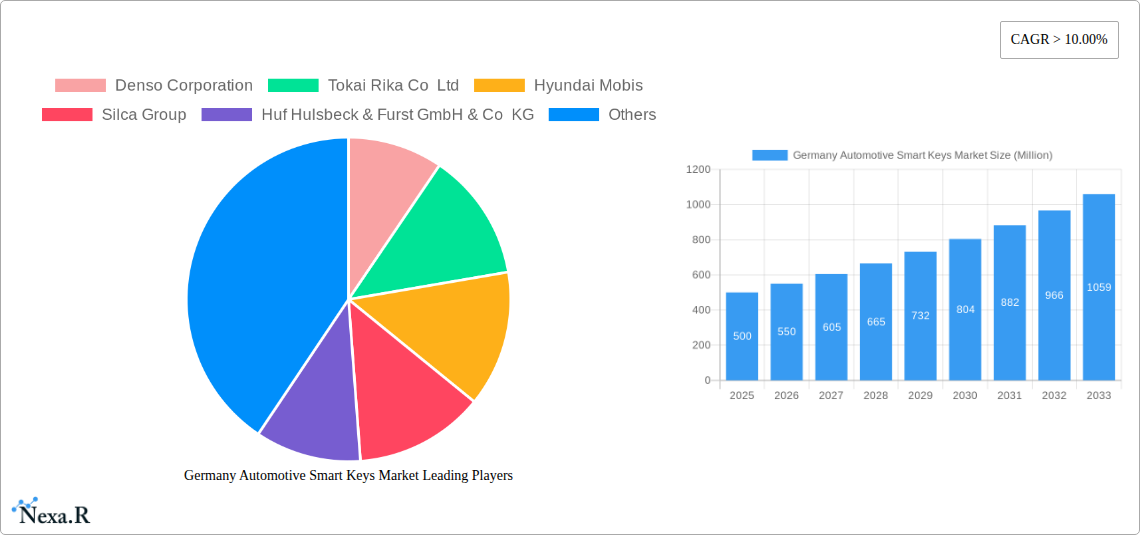Key Insights
The German automotive smart key market is poised for significant expansion, driven by escalating vehicle production, growing consumer demand for advanced convenience features, and robust safety regulations. Projections indicate a compound annual growth rate (CAGR) of 6.8%. Growth is primarily attributed to the widespread adoption of Passive Keyless Entry (PKE) systems, which offer superior convenience and security over traditional Remote Keyless Entry (RKE) systems. The multi-function smart key segment is experiencing heightened demand due to integrated features like remote vehicle start and location tracking. While Original Equipment Manufacturer (OEM) installations lead the market, the aftermarket segment is also expanding, fueled by replacement and upgrade needs. Leading players, including Denso, Tokai Rika, Continental, and Bosch, are heavily investing in R&D to advance smart key technology, focusing on enhanced security, extended battery life, and seamless vehicle system integration. Key automotive manufacturing hubs in Germany, such as North Rhine-Westphalia, Bavaria, and Baden-Württemberg, represent significant market concentrations. The forecast period of 2025-2033 anticipates sustained market growth, propelled by technological innovations and the integration of smart key technology into electric and autonomous vehicles.

Germany Automotive Smart Keys Market Market Size (In Million)

Sustained growth in the German automotive smart key market will depend on continuous technological advancements, particularly in anti-hacking security measures and user experience improvements. The ongoing electrification of the automotive sector presents a substantial opportunity, with smart key systems increasingly becoming standard in electric vehicles. However, market expansion may be constrained by implementation costs, especially for aftermarket solutions, and the emergence of alternative access control technologies. Intense competition among major automotive component suppliers is expected, with a focus on innovation, strategic alliances, and cost optimization. Future market performance will also be influenced by consumer adoption rates and the effectiveness of marketing efforts highlighting the benefits of smart key technology. Based on current trends and technological progress, the market size in 2025 is estimated at €545.9 million.

Germany Automotive Smart Keys Market Company Market Share

This comprehensive report analyzes the Germany Automotive Smart Keys Market, covering market dynamics, growth drivers, key segments, product offerings, challenges, opportunities, and major stakeholders. The study period spans 2019-2033, with 2025 designated as the base year. Market forecasts for 2025-2033 are provided. The market size is presented in millions.
Parent Market: German Automotive Aftermarket Child Market: Automotive Smart Keys
Germany Automotive Smart Keys Market Market Dynamics & Structure
This section analyzes the competitive landscape of the German automotive smart keys market, focusing on market concentration, technological innovation, regulatory influences, and competitive dynamics. The market is characterized by a moderately concentrated structure, with key players holding significant market share. Technological innovation, particularly in areas like biometric authentication and improved security features, is a primary growth driver. Stringent automotive safety regulations in Germany further shape market dynamics. The rise of connected car technology presents both opportunities and challenges, while the increasing adoption of electric vehicles is influencing smart key design and functionality. M&A activity in the sector has been moderate, with strategic partnerships and collaborations playing a more prominent role.
- Market Concentration: Moderately concentrated, with top 5 players holding approximately xx% market share in 2025.
- Technological Innovation: Key drivers include advancements in biometric authentication, improved security algorithms, and integration with connected car systems.
- Regulatory Framework: Stringent automotive safety and data privacy regulations in Germany significantly influence market development.
- Competitive Substitutes: Traditional key systems pose a limited threat given the increasing demand for enhanced convenience and security.
- End-User Demographics: Primarily focused on private car owners and fleet operators, with growing demand in luxury vehicle segments.
- M&A Trends: Moderate M&A activity, with a growing trend toward strategic partnerships for technological advancements and market expansion. An estimated xx M&A deals occurred between 2019 and 2024.
Germany Automotive Smart Keys Market Growth Trends & Insights
The Germany Automotive Smart Keys Market has witnessed consistent growth over the historical period (2019-2024), driven by increasing vehicle sales, rising consumer preference for advanced security and convenience features, and technological advancements. The market size in 2024 was estimated at xx million units. The CAGR during the historical period was approximately xx%. The adoption rate of smart keys is expected to increase steadily, driven by rising disposable incomes and the growing penetration of luxury and premium vehicles. Technological disruptions, such as the integration of smartphone-based key systems and the use of NFC technology, are reshaping the market landscape. Consumer behavior is shifting towards greater preference for seamless integration of smart keys with other in-car systems and mobile applications. The forecast period (2025-2033) anticipates continued growth, with a projected CAGR of xx%, reaching an estimated xx million units by 2033. Market penetration is expected to reach xx% by 2033.
Dominant Regions, Countries, or Segments in Germany Automotive Smart Keys Market
The German automotive smart keys market is relatively homogenous, with no single region or state exhibiting significantly higher growth than others. However, urban areas demonstrate higher adoption rates due to higher vehicle ownership and consumer preference for advanced automotive features. The OEM segment dominates the market, accounting for approximately xx% of total sales, driven by high initial equipment integration in new vehicles. However, the aftermarket segment displays robust growth potential, driven by rising replacement demand and growing vehicle parc.
- By Application Type: Multi-function smart keys dominate, accounting for approximately xx% of the market due to their enhanced features and convenience.
- By Technology Type: Passive Keyless Entry (PKE) systems are gaining traction, surpassing Remote Keyless Entry (RKE) systems due to the enhanced convenience and security features.
- By Installation Type: The OEM segment maintains dominance, with the aftermarket segment showing promising growth potential.
- Key Drivers: High vehicle ownership, preference for advanced in-car technology, robust automotive industry, and favorable government policies supporting technological advancements.
Germany Automotive Smart Keys Market Product Landscape
The German automotive smart key market offers a diverse range of products, varying in features and functionalities. Innovation focuses on enhanced security measures, improved usability (e.g., buttonless operation, haptic feedback), and seamless integration with mobile apps. The integration of biometric authentication and advanced cryptography enhances security while features like remote vehicle control and location tracking add to convenience. Manufacturers focus on differentiating through unique selling propositions like extended battery life and durable construction.
Key Drivers, Barriers & Challenges in Germany Automotive Smart Keys Market
Key Drivers: The primary drivers include increasing vehicle production, growing consumer demand for enhanced vehicle security and convenience features, government regulations promoting advanced automotive technologies, and the continuous improvement of smart key technology.
Key Barriers & Challenges: The challenges include high initial costs of implementation, security vulnerabilities, potential for signal jamming, and the complexity of integrating smart keys with different vehicle systems. The supply chain disruptions experienced in recent years have also impacted availability and pricing, creating market fluctuations.
Emerging Opportunities in Germany Automotive Smart Keys Market
Emerging opportunities include the integration of smart keys with smartphone apps for remote vehicle control, development of more secure authentication methods (e.g., biometric sensors, blockchain technology), and expansion into the commercial vehicle segment. The adoption of digital keys and the integration of smart keys with other connected car services provide significant opportunities for growth.
Growth Accelerators in the Germany Automotive Smart Keys Market Industry
Technological advancements, including the development of more secure and user-friendly smart key systems and their seamless integration with connected car ecosystems, are key growth accelerators. Strategic partnerships between key players are crucial for accelerating innovation and market penetration. Government initiatives promoting the adoption of advanced automotive technologies also play a significant role in stimulating growth.
Key Players Shaping the Germany Automotive Smart Keys Market Market
- Denso Corporation
- Tokai Rika Co Ltd
- Hyundai Mobis
- Silca Group
- Huf Hulsbeck & Furst GmbH & Co KG
- HELLA GmbH & Co KGaA
- Continental AG
- ALPHA Corporation
- Valeo SA
- Robert Bosch Gmb
- ZF Friedrichshafen AG
Notable Milestones in Germany Automotive Smart Keys Market Sector
- 2021: Introduction of a new generation of smart keys with enhanced security features by Continental AG.
- 2022: Bosch announces a partnership with a leading smartphone manufacturer to integrate digital keys into its smart key systems.
- 2023: ZF Friedrichshafen AG launches a new smart key system with advanced biometric authentication capabilities.
- 2024: A significant merger between two key players in the aftermarket segment reshapes market dynamics.
In-Depth Germany Automotive Smart Keys Market Market Outlook
The future of the German automotive smart keys market appears promising, driven by ongoing technological advancements, growing consumer demand, and supportive regulatory frameworks. Continued integration with connected car technologies and the expansion into new vehicle segments will further fuel growth. Strategic partnerships and investments in R&D will remain crucial for sustaining a competitive edge and realizing the substantial market potential.
Germany Automotive Smart Keys Market Segmentation
-
1. Application Type
- 1.1. Single Function
- 1.2. Multi-function
-
2. Technology Type
- 2.1. Remote Keyless Entry
- 2.2. Passive Keyless Entry
-
3. Installation Type
- 3.1. OEM
- 3.2. Aftermarket
Germany Automotive Smart Keys Market Segmentation By Geography
- 1. Germany

Germany Automotive Smart Keys Market Regional Market Share

Geographic Coverage of Germany Automotive Smart Keys Market
Germany Automotive Smart Keys Market REPORT HIGHLIGHTS
| Aspects | Details |
|---|---|
| Study Period | 2020-2034 |
| Base Year | 2025 |
| Estimated Year | 2026 |
| Forecast Period | 2026-2034 |
| Historical Period | 2020-2025 |
| Growth Rate | CAGR of 6.8% from 2020-2034 |
| Segmentation |
|
Table of Contents
- 1. Introduction
- 1.1. Research Scope
- 1.2. Market Segmentation
- 1.3. Research Methodology
- 1.4. Definitions and Assumptions
- 2. Executive Summary
- 2.1. Introduction
- 3. Market Dynamics
- 3.1. Introduction
- 3.2. Market Drivers
- 3.2.1. Rising Demand of Electric Vehicles Is Likely To Drive The Market Growth
- 3.3. Market Restrains
- 3.3.1. Lack of Skilled Labors Is Anticipated To Restrain The market Growth
- 3.4. Market Trends
- 3.4.1. Electric Vehicle will Drive the Market
- 4. Market Factor Analysis
- 4.1. Porters Five Forces
- 4.2. Supply/Value Chain
- 4.3. PESTEL analysis
- 4.4. Market Entropy
- 4.5. Patent/Trademark Analysis
- 5. Germany Automotive Smart Keys Market Analysis, Insights and Forecast, 2020-2032
- 5.1. Market Analysis, Insights and Forecast - by Application Type
- 5.1.1. Single Function
- 5.1.2. Multi-function
- 5.2. Market Analysis, Insights and Forecast - by Technology Type
- 5.2.1. Remote Keyless Entry
- 5.2.2. Passive Keyless Entry
- 5.3. Market Analysis, Insights and Forecast - by Installation Type
- 5.3.1. OEM
- 5.3.2. Aftermarket
- 5.4. Market Analysis, Insights and Forecast - by Region
- 5.4.1. Germany
- 5.1. Market Analysis, Insights and Forecast - by Application Type
- 6. Competitive Analysis
- 6.1. Market Share Analysis 2025
- 6.2. Company Profiles
- 6.2.1 Denso Corporation
- 6.2.1.1. Overview
- 6.2.1.2. Products
- 6.2.1.3. SWOT Analysis
- 6.2.1.4. Recent Developments
- 6.2.1.5. Financials (Based on Availability)
- 6.2.2 Tokai Rika Co Ltd
- 6.2.2.1. Overview
- 6.2.2.2. Products
- 6.2.2.3. SWOT Analysis
- 6.2.2.4. Recent Developments
- 6.2.2.5. Financials (Based on Availability)
- 6.2.3 Hyundai Mobis
- 6.2.3.1. Overview
- 6.2.3.2. Products
- 6.2.3.3. SWOT Analysis
- 6.2.3.4. Recent Developments
- 6.2.3.5. Financials (Based on Availability)
- 6.2.4 Silca Group
- 6.2.4.1. Overview
- 6.2.4.2. Products
- 6.2.4.3. SWOT Analysis
- 6.2.4.4. Recent Developments
- 6.2.4.5. Financials (Based on Availability)
- 6.2.5 Huf Hulsbeck & Furst GmbH & Co KG
- 6.2.5.1. Overview
- 6.2.5.2. Products
- 6.2.5.3. SWOT Analysis
- 6.2.5.4. Recent Developments
- 6.2.5.5. Financials (Based on Availability)
- 6.2.6 HELLA GmbH & Co KGaA
- 6.2.6.1. Overview
- 6.2.6.2. Products
- 6.2.6.3. SWOT Analysis
- 6.2.6.4. Recent Developments
- 6.2.6.5. Financials (Based on Availability)
- 6.2.7 Continental AG
- 6.2.7.1. Overview
- 6.2.7.2. Products
- 6.2.7.3. SWOT Analysis
- 6.2.7.4. Recent Developments
- 6.2.7.5. Financials (Based on Availability)
- 6.2.8 ALPHA Corporation
- 6.2.8.1. Overview
- 6.2.8.2. Products
- 6.2.8.3. SWOT Analysis
- 6.2.8.4. Recent Developments
- 6.2.8.5. Financials (Based on Availability)
- 6.2.9 Valeo SA
- 6.2.9.1. Overview
- 6.2.9.2. Products
- 6.2.9.3. SWOT Analysis
- 6.2.9.4. Recent Developments
- 6.2.9.5. Financials (Based on Availability)
- 6.2.10 Robert Bosch Gmb
- 6.2.10.1. Overview
- 6.2.10.2. Products
- 6.2.10.3. SWOT Analysis
- 6.2.10.4. Recent Developments
- 6.2.10.5. Financials (Based on Availability)
- 6.2.11 ZF Friedrichshafen AG
- 6.2.11.1. Overview
- 6.2.11.2. Products
- 6.2.11.3. SWOT Analysis
- 6.2.11.4. Recent Developments
- 6.2.11.5. Financials (Based on Availability)
- 6.2.1 Denso Corporation
List of Figures
- Figure 1: Germany Automotive Smart Keys Market Revenue Breakdown (million, %) by Product 2025 & 2033
- Figure 2: Germany Automotive Smart Keys Market Share (%) by Company 2025
List of Tables
- Table 1: Germany Automotive Smart Keys Market Revenue million Forecast, by Application Type 2020 & 2033
- Table 2: Germany Automotive Smart Keys Market Revenue million Forecast, by Technology Type 2020 & 2033
- Table 3: Germany Automotive Smart Keys Market Revenue million Forecast, by Installation Type 2020 & 2033
- Table 4: Germany Automotive Smart Keys Market Revenue million Forecast, by Region 2020 & 2033
- Table 5: Germany Automotive Smart Keys Market Revenue million Forecast, by Application Type 2020 & 2033
- Table 6: Germany Automotive Smart Keys Market Revenue million Forecast, by Technology Type 2020 & 2033
- Table 7: Germany Automotive Smart Keys Market Revenue million Forecast, by Installation Type 2020 & 2033
- Table 8: Germany Automotive Smart Keys Market Revenue million Forecast, by Country 2020 & 2033
Frequently Asked Questions
1. What is the projected Compound Annual Growth Rate (CAGR) of the Germany Automotive Smart Keys Market?
The projected CAGR is approximately 6.8%.
2. Which companies are prominent players in the Germany Automotive Smart Keys Market?
Key companies in the market include Denso Corporation, Tokai Rika Co Ltd, Hyundai Mobis, Silca Group, Huf Hulsbeck & Furst GmbH & Co KG, HELLA GmbH & Co KGaA, Continental AG, ALPHA Corporation, Valeo SA, Robert Bosch Gmb, ZF Friedrichshafen AG.
3. What are the main segments of the Germany Automotive Smart Keys Market?
The market segments include Application Type, Technology Type, Installation Type.
4. Can you provide details about the market size?
The market size is estimated to be USD 545.9 million as of 2022.
5. What are some drivers contributing to market growth?
Rising Demand of Electric Vehicles Is Likely To Drive The Market Growth.
6. What are the notable trends driving market growth?
Electric Vehicle will Drive the Market.
7. Are there any restraints impacting market growth?
Lack of Skilled Labors Is Anticipated To Restrain The market Growth.
8. Can you provide examples of recent developments in the market?
N/A
9. What pricing options are available for accessing the report?
Pricing options include single-user, multi-user, and enterprise licenses priced at USD 3800, USD 4500, and USD 5800 respectively.
10. Is the market size provided in terms of value or volume?
The market size is provided in terms of value, measured in million.
11. Are there any specific market keywords associated with the report?
Yes, the market keyword associated with the report is "Germany Automotive Smart Keys Market," which aids in identifying and referencing the specific market segment covered.
12. How do I determine which pricing option suits my needs best?
The pricing options vary based on user requirements and access needs. Individual users may opt for single-user licenses, while businesses requiring broader access may choose multi-user or enterprise licenses for cost-effective access to the report.
13. Are there any additional resources or data provided in the Germany Automotive Smart Keys Market report?
While the report offers comprehensive insights, it's advisable to review the specific contents or supplementary materials provided to ascertain if additional resources or data are available.
14. How can I stay updated on further developments or reports in the Germany Automotive Smart Keys Market?
To stay informed about further developments, trends, and reports in the Germany Automotive Smart Keys Market, consider subscribing to industry newsletters, following relevant companies and organizations, or regularly checking reputable industry news sources and publications.
Methodology
Step 1 - Identification of Relevant Samples Size from Population Database



Step 2 - Approaches for Defining Global Market Size (Value, Volume* & Price*)

Note*: In applicable scenarios
Step 3 - Data Sources
Primary Research
- Web Analytics
- Survey Reports
- Research Institute
- Latest Research Reports
- Opinion Leaders
Secondary Research
- Annual Reports
- White Paper
- Latest Press Release
- Industry Association
- Paid Database
- Investor Presentations

Step 4 - Data Triangulation
Involves using different sources of information in order to increase the validity of a study
These sources are likely to be stakeholders in a program - participants, other researchers, program staff, other community members, and so on.
Then we put all data in single framework & apply various statistical tools to find out the dynamic on the market.
During the analysis stage, feedback from the stakeholder groups would be compared to determine areas of agreement as well as areas of divergence


